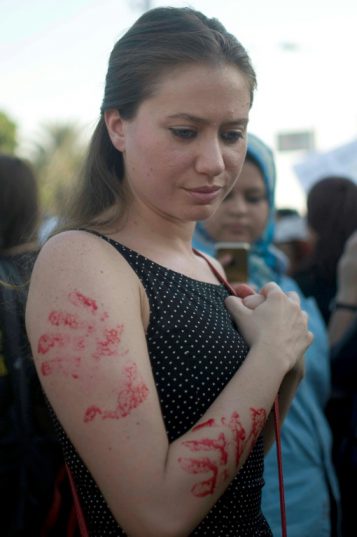‘Malema has created a militant style of leadership in the EFF’
Emboldened by the global outpouring, female internet users in the country took to their computers to document their own accounts of unwanted advances and violence in the latest push to speak out over the endemic problem despite a conservative backlash from society.
“One time when I was pregnant… a man harassed me in the middle of a market, and when I hit him in his chest, he slapped me,” one contributor Basma Mostafa wrote in a public post on Facebook. “It’s terrifying and doesn’t stop at just harassment.”
“I stopped walking in the street,” another woman Youstina Tharwat wrote. “I spent about half my salary… on taxis just to avoid being dragged about or harassed.”
The targeting of women in Egypt has long been a major problem and statistics on the scale of the threat they face make shocking reading.
In 2013 a UN study said that 99.3 percent of women had experienced at least one form of harassment and 82.6 percent did not feel safe in the streets.
– ‘More courageous’ –
Public debate over the rampant harassment in Egypt has grown since the 2011 uprising that ousted Hosni Mubarak.
Back then graffiti condemning the behaviour spread around downtown Cairo, volunteers organised themselves into groups to rescue women from mob attacks, and more women shared their stories publicly.
Women took to the streets brandishing knives in a symbolic protest against sexual violence in 2013 and a year later the authorities officially criminalised harassment, making it easier for women to take those that target them to court.
But the situation still remains dire for women in the country and internet campaigns have become a vital way for them to air their experiences.

An Egyptian woman with red paint hand prints on her arm takes part in a protest against sexual harasment in front of the Opera House in the capital Cairo on June 14, 2014
Earlier this year, Egyptian women launched a homegrown online campaign with a hashtag in Arabic: “The first I was harassed my age was”.
Now, activist Mozn Hassan said the #MeToo campaign — which sprung up in reaction to revelations over alleged sexual harassment by film producer Harvey Weinstein — helped even more to come forward with their accounts.
“The campaign showed that women in Egypt have indeed become more courageous than before in their accounts of their experiences of harassment,” said Hassan, the executive director of leading rights group Nazra for Feminist Studies.
– ‘Backlash from society’ –
Despite the growing willingness of Egyptian women to speak out online, the clamour against harassment still remains relatively muted and the situation in the streets is yet to get better.
In recent days inflammatory comments by a lawyer saying raping lightly dressed women was a “national duty” were shared online, drawing condemnation from the government’s National Council for Women.
Hassan said that unlike their counterparts abroad celebrities in Egypt did not join the #MeToo campaign “because they consider it a stain on Egypt’s reputation and fear a backlash from society.”
Taher Aboelnasr, a lawyer who has handled sexual harassment cases, said the campaign “was limited” to the middle and upper classes, even though it had a significant impact there.
Despite legal advances over harassment, deep-rooted popular sentiments in the conservative Muslim country means that the number of women willing to officially register a complaint remains negligible.
“The percentage of girls and women who file harassment reports is very small because society’s culture doesn’t allow that,” Aboelnasr said.
And even when a case does end up going to court the victims of harassment can get pressured into dropping their claims, he said, citing the experiences of one of his clients who tried to press charges.
In the end she “preferred reconciliation in the case, fearing the reaction of the defendant’s family if he was sentenced to prison,” he said.
Download our app and read this and other great stories on the move. Available for Android and iOS.